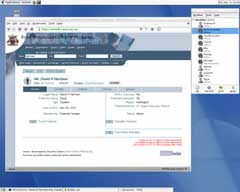After stumbling on the FlashLinux website a few nights ago I had been itching to give this USB based distribution a try due to its inherit potential for becoming a truly portable desktop environment. I have been using Live CDs for a while now mainly for system recovery. Whilst useful I have three issues with the CD distributions. Firstly you cannot save preferences/files (unless you use a USB key), secondly they are generally slow because CD-Roms are not fast and thirdly a CD-Rom is just too big to fit in your pocket.
USB key distributions interest me because I am reasonably mobile. I have a couple of offices plus clients dotted around the city. Also I have a lengthy trip planned in the future and the idea of taking a few USB key based desktops away with me really appeals.

Working Desktop (click to enlarge)